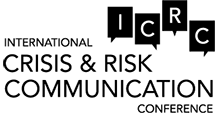
Project Researcher
Department of Communication, University of Jyväskylä
Finland
Anne Laajalahti, is a project researcher in Organizational Communication and PR at the Department of Communication, University of Jyväskylä, Finland. Besides doing research work for two international EU-funded FP7 projects, “Public Empowerment Policies for Crisis Management” and “CBRN crisis management: Architecture, Technologies and Operational Procedures”, she is teaching and supervising in the fields of Communication and Qualitative Research. In addition, she is finalizing her Ph.D. research in Speech Communication focusing on interpersonal communication competence and its development in the work of researchers.
Breakout Session: A Competence-Based Approach to Crisis Communication*
Crises are complex, fast-developing and unpredictable by their nature. Therefore, co-operation between response organizations and citizen groups is needed in co-producing safety and adapting to changing situations. Since response organizations cannot solve all the problems created by crises alone, this presentation calls for a community approach to crisis management (e.g., Helsloot & Ruitenberg, 2004; Norris et al., 2008), where citizen groups are seen as active co-actors in crisis response instead of being target groups.
Co-producing safety necessitates competence in interpersonal communication and social interaction both from the experts working in response organizations (Laajalahti, Hyvärinen & Vos 2013a) and from the ordinary citizens involved in crises (Laajalahti, Hyvärinen & Vos 2013b). Interpersonal communication competence refers to knowledge, skills and motivation that can be perceived as effective and appropriate in social interaction (e.g., Greene & Burleson, 2003; Spitzberg & Cupach, 2002). Research has not often approached crises from the viewpoint of interpersonal communication competence, which is in this presentation applied to a crisis communication and management context and referred to as crisis communication competence (CCC).
The aim of the presentation is to clarify the components of CCC needed by crisis communication and management experts and citizens when co-operating in response to disasters and emergencies. The purpose is to deepen understanding of how response organizations can improve their CCC and support the development of citizens’ CCC and so enhance community resilience and citizen response and contribute to the functioning of response networks.
The research task is approached qualitatively by examining both crisis communication and management experts’ and citizens’ perceptions of the CCC that they need in co-producing safety. The data 1 were gathered via an international online questionnaire sent to experts (N=42) working in the field of crisis response, and it consists of answers to open-ended questions addressing the core requirements of experts’ CCC. The data 2 were collected by means of focus group interviews (N=3) which comprised a total of 21 citizens, with 6 to 9 interviewees in each group. After the data gathering, both research data were analysed separately from a data-driven perspective using qualitative content analysis.
The research findings indicate that co-producing safety demands various kinds of CCC both from crisis communication and management experts and from citizens. The requirements of experts’ CCC can be divided into 1) message production, 2) message reception and 3) interaction between experts and citizen groups. The requirements of citizens’ CCC can be grouped according to whether they are related to 1) information seeking, 2) information sharing, 3) deployment of information and communication technologies, 4) interaction among other citizens or 5) interaction with experts working in response organizations.
The presentation suggests that while acknowledging experts’ and citizens’ individual needs future research should not pursue CCC solely as a characteristic of individuals but as co-created in the relationships between experts and citizen groups forming the response network. Besides mapping the components of CCC, the nature of CCC as a networked competence area is reflected theoretically and a model of competence-based approach to crisis communication is presented.
*Anne Laajalahti, Jenni Hyvärinen and Marita Vos co-authored this paper. Anne Laajalahti will be presenting.
